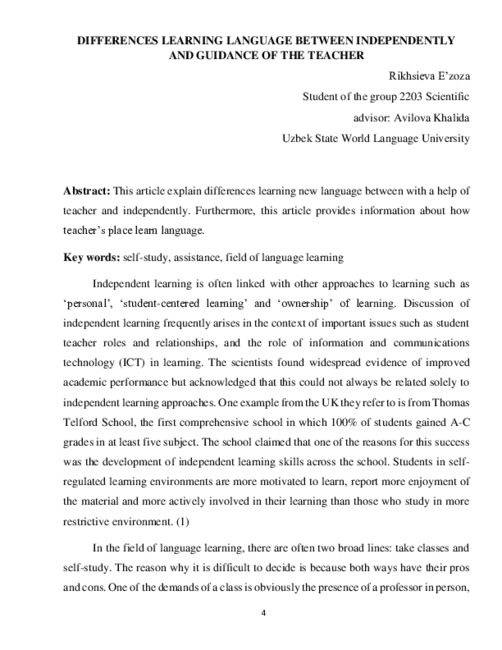
4
DIFFERENCES LEARNING LANGUAGE BETWEEN INDEPENDENTLY
AND GUIDANCE OF THE TEACHER
Rikhsieva E’zoza
Student of the group 2203 Scientific
advisor: Avilova Khalida
Uzbek State World Language University
Abstract:
This article explain differences learning new language between with a help of
teacher and independently. Furthermore, this article provides information about how
teacher’s place learn language.
Key words:
self-study, assistance, field of language learning
Independent learning is often linked with other approaches to learning such as
‘personal’, ‘student-centered learning’ and ‘ownership’ of learning. Discussion of
independent learning frequently arises in the context of important issues such as student
teacher roles and relationships, and the role of information and communications
technology (ICT) in learning. The scientists found widespread evidence of improved
academic performance but acknowledged that this could not always be related solely to
independent learning approaches. One example from the UK they refer to is from Thomas
Telford School, the first comprehensive school in which 100% of students gained A-C
grades in at least five subject. The school claimed that one of the reasons for this success
was the development of independent learning skills across the school. Students in self-
regulated learning environments are more motivated to learn, report more enjoyment of
the material and more actively involved in their learning than those who study in more
restrictive environment. (1)
In the field of language learning, there are often two broad lines: take classes and
self-study. The reason why it is difficult to decide is because both ways have their pros
and cons. One of the demands of a class is obviously the presence of a professor in person,

5
someone is there to give you knowledge and monitor your progress. This is advantages
of the class learning: you are not alone, a person is there to guide you and make sure you
stay on track. Regarding self-studying. It is the opposite : you do not have any teacher.
The problem of self-study is obviously the loneliness it implies: you are left alone with
yourself and you do not have anydiv to motivate you or to consult whenever you have
doubt. (2)
Self-learning can be quite useful for those who do not have the time to enroll in formal
courses and degrees as well as for those who cannot travel to specific location to educate
themselves. Besides you can choose your own pace, materials methods, everything is up
to you. Working with teacher and teams increase collaboration and allows brainstorming.
As a result, more ideas are developed and productivity improves. Two or more people are
always better than one for solving problems, finishing off difficult tasks and increasing
creativity. (3)
Since you are both a teacher and a student in one person, you have the opportunity to
independently develop a schedule and pace of learning. Taking into account the free time
and time that you can allocate for learning your target language, make yourself an
individual plan. Lack of criticism. For those who, from school age, cannot stand criticism
from the outside, independent learning will be the ideal solution. There is only you and
your target language and nodiv and nothing else. In case of errors, no one will point
you to them, and at first there will be a lot of them: in reading, in pronunciation, in writing,
in grammar. Lack of outside control can play a very bad joke. As a result, you will not
have enough knowledge to feel free among native speakers. (4)
In conclusion, the two ways of learning both have pros and cons, so I am not going to
recommend learn independently or guidance of the teacher. Whichever way you choose,
always keep your independence and diversity of your activities as much as possible. In
my opinion, learning a language is related to you and your interest, and knowledge. If
you have enough experience you can study independently.
Used literature:
1.
Bill Mayer, Naomi Haywood, Darshan Sachdev and Sally Faraday.

6
London: Department for Children, Schools and families Research report 051, 2005
2.
https://blogfrenchfluent.com/better-learn-language-alone-class/
3.
https://www.vapulus.com/en/advantages-and-disadvantages-of-self-learning/
4.
Education July 11,2021
5.
Ozoda, Xakimboyeva, Djurayeva Dilnavoz, and Turg'unova Dinara. "Teaching
vocabulary in context for A1 level learners." ACADEMICIA: An International
Multidisciplinary Research Journal 11.4 (2021): 1416-1422.
6.
Xakimbayeva, O. K., and Ozod Mardonov. "TILSHUNOSLIKDA SIYOSIY
DISKURS TUSHUNCHASI." Новости образования: исследование в XXI веке 1.6
(2023): 1044-1046.





